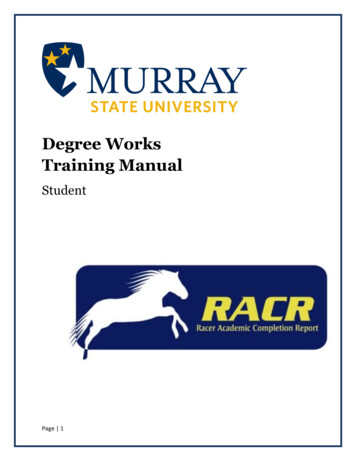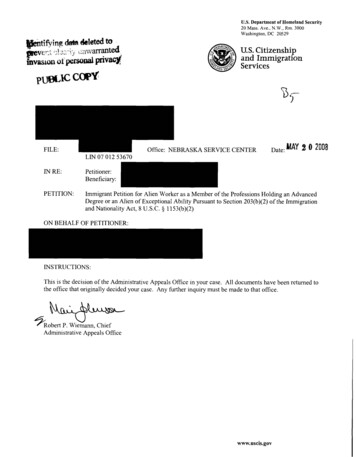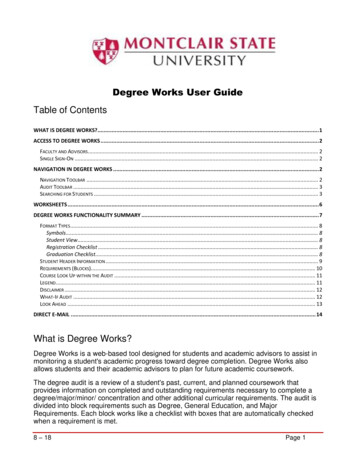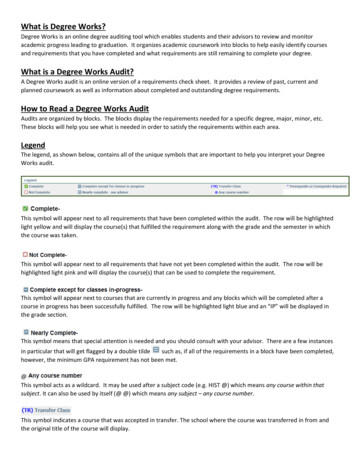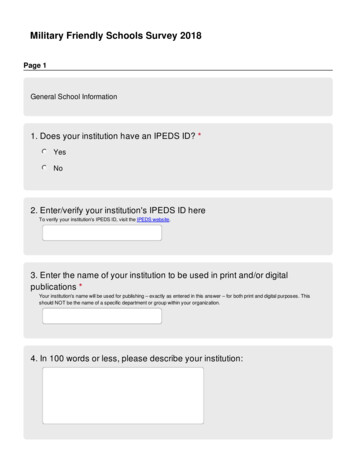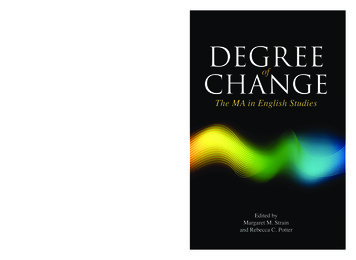
Transcription
Degree of Change coverSpread.qxp Layout 1 10/20/16 10:55 AM Page 1Looking primarily at stand-alone master’s programs, this volumeexamines the design, delivery, and value of a master’s degree in Englishin the twenty-first century and challenges the characterization that MAprograms in English serve primarily as stepping-stones to the PhD.Rather, contributors reveal how central the MA is to shaping the purposeand identity of contemporary English studies, through descriptions of avariety of specific MA programs.Rebecca C. Potter is an associate professor of English and Americanliterature at the University of Dayton, where she is also associated withthe Sustainability, Energy and the Environment (SEE) program.Margaret M. Strain is a professor of English at the University ofDayton, where she teaches undergraduate and graduate courses inwriting, composition theory, histories of rhetoric, and Irish drama.DEGREECHANGEofThe MA in English StudiesStrain PotterGathering perspectives from faculty, program directors, and studentsfrom across the country, Strain and Potter showcase not only thediversity of such programs, but also the ways in which program identityand mission are richly interwoven with concerns about local needs,graduate student career trajectories, and the effects of a market-driveneducational climate. This collection provides a substantive discussionthat goes beyond questioning the state of English studies—it points tocurricular, programmatic, and professional innovations that aretransforming the field, calling for new dialogue in higher educationabout the pivotal role of the MA in English.DEGREE of CHANGEAs the needs of those seeking an MA in English studies have evolved,so too have the degree’s mission and identity. Margaret M. Strain andRebecca C. Potter, editors of Degree of Change: The MA in EnglishStudies, argue that the MA is positioned in a dynamic contact zone—“aplace where disciplinary knowledge, student need, and local exigenciesinteract and where disciplinary identity is constantly negotiated.”Edited byMargaret M. Strainand Rebecca C. Potter
Staff iEditor:ntrodBonnyu c t i GrahamonInterior Design: Jenny Jensen GreenleafCover Design: Pat MayerCover Image: Ingram Publishing/iStock/ThinkstockNCTE Stock Number: 10799; eStock Number: 10805ISBN 978-0-8141-1079-9; eISBN 978-0-8141-1080-5 2016 by the National Council of Teachers of English.All rights reserved. No part of this publication may be reproduced or transmitted in any form or by any means, electronic or mechanical, includingphotocopy, or any information storage and retrieval system, without permission from the copyright holder. Printed in the United States of America.It is the policy of NCTE in its journals and other publications to provide aforum for the open discussion of ideas concerning the content and the teaching of English and the language arts. Publicity accorded to any particularpoint of view does not imply endorsement by the Executive Committee, theBoard of Directors, or the membership at large, except in announcementsof policy, where such endorsement is clearly specified.NCTE provides equal employment opportunity (EEO) to all staff membersand applicants for employment without regard to race, color, religion, sex,national origin, age, physical, mental or perceived handicap/disability, sexualorientation including gender identity or expression, ancestry, genetic information, marital status, military status, unfavorable discharge from militaryservice, pregnancy, citizenship status, personal appearance, matriculation orpolitical affiliation, or any other protected status under applicable federal,state, and local laws.Every effort has been made to provide current URLs and email addresses,but because of the rapidly changing nature of the Web, some sites andaddresses may no longer be accessible.Library of Congress Cataloging-in-Publication DataNames: Strain, Margaret M., editor. Potter, Rebecca C., editor. National Council of Teachers of English.Title: Degree of change : the MA in English studies / edited byMargaret M. Strain and Rebecca C. Potter.Description: Urbana, Illinois : National Council of Teachers of English,[2016] Includes bibliographical references and index.Identifiers: LCCN 2016027930 (print) LCCN 2016044801 (ebook) ISBN 9780814110799 (pbk.) ISBN 9780814110805 (eISBN) ISBN9780814110805Subjects: LCSH: English philology—Study and teaching—United States. Graduate students—United States. English teacher—Training of. Universities and colleges—Curricula—United States.Classification: LCC PE68.U5 D44 2016 (print) LCC PE68.U5 (ebook) DDC 420.71/1—dc23 iv LC record available at d 410/19/16 9:43 AM
Degree of Change C ontentsAcknowledgments . . . . . . . . . . . . . . . . . . . . . . . . . . . . . . . . . . . . . . . . . . . . ixIntroduction: Degree of Change. . . . . . . . . . . . . . . . . . . . . . . . . . . . . . xiMargaret M. StrainI Disciplinary Shifts1 The Locally Responsive, Socially Productive MA inComposition. . . . . . . . . . . . . . . . . . . . . . . . . . . . . . . . . . . . . . . . . . . . . . . 3Kory Lawson Ching, Tara Lockhart, and Mark Roberge2 English Online/On the Line: The Challenges of SustainingDisciplinary Relevance in the Twenty-First Century. . . . . . . . 22Kristine L. Blair3 Academic Capitalism, Student Needs, and the EnglishMA. . . . . . . . . . . . . . . . . . . . . . . . . . . . . . . . . . . . . . . . . . . . . . . . . . . . . . . 41Mark Mossman4 But Can You Teach Composition? The Relevance ofLiterary Studies for the MA Degree . . . . . . . . . . . . . . . . . . . . . . . . 59Rebecca C. PotterII Programmatic Transformations5 From Political Constraints to Program Innovation:Professionalizing the Master’s Degree in English. . . . . . . . . . . . 79Kaye Adkins6 Boundary Crossings and Collaboration in a GraduateCertificate in Teaching Writing . . . . . . . . . . . . . . . . . . . . . . . . . . . . 99Steve Fox and Kim Brian Lovejoy7 TextSupport: Incorporating Online Pedagogy intoMA English Programs. . . . . . . . . . . . . . . . . . . . . . . . . . . . . . . . . . . . 120Abigail G. Scheg vii aStrain-10799fm.indd 710/19/16 9:43 AM
Degree of Change Introduction:Degree of ChangeMargaret M. StrainUniversity of DaytonThe history of higher education in the United States is oneof admixture. The first American colleges initially followeda British educational model, with a prescribed classical curriculum characterized by lecture, recitation, and disputation.Undergraduate students finished their course of study by earninga baccalaureate degree. Those who completed advanced work(sometimes with a thesis) graduated with a master of arts, thehighest postsecondary degree awarded. In the nineteenth century,the German university, with its expanded curricula, scientific approaches to research, and disciplinary organization, appealed toa new nation experiencing urbanization, industrial growth, andwestern expansion. American education reformers began callingfor the creation of “universities” to remedy the limitations ofliberal arts colleges. A vital part of this educational revision wasthe addition of the PhD as the culminating degree. In many cases,institutions imposed a graduate university structure onto existingundergraduate and masters-granting schools (e.g., Harvard andYale). The opening of Johns Hopkins University in 1876 markedthe first American institution conceived according to the German university model (Parker; Berlin). With this shift, the PhDsupplanted the MA as the benchmark preferred terminal degree(Storr 47–56).The rise of the new university in the United States had important consequences for higher education. It created a hierarchicalrelationship between the PhD and the MA. The tiered system alsogave rise to a distinction in the purpose of graduate education—a xi aStrain-10799fm.indd 1110/19/16 9:43 AM
introductiontension that troubles us still—and that is the difference between,as Bernard Berelson puts it, “graduate education and graduatetraining” (i.e., the pursuit of knowledge for its own sake andpreparation for a profession) (8). Masters programs providedgraduates with coursework in areas such as education, engineering, commerce, technology, medicine, fine arts, and journalismand led to employment in various professional fields. In the fieldof English studies, the MA offered training for teachers andeducational administrators. A PhD in English signaled more rigorous scholarship in the study of literature, with the end resultof reproducing the next generation of academic scholar-leaders.The MA in English studies thus came to be seen in two ways: aseither a stepping-stone to, or, failing that, a “consolation prize”(Bartlett 26; Dalbey 17) for those who did not qualify for, theproper end of graduate education: the doctorate.1In the twentieth century, the master’s degree, though diminished by its now medial position in higher education, never lost itsvalue as a training ground for newly enfranchised learners (e.g.,women, African Americans) and those seeking additional credentials (Stimpson 146; Steward). Indeed, especially after WorldWar II, the number of master’s programs in the United States faroutstripped doctoral ones. In fact, despite the growing preference for a PhD-wielding professoriate, the master’s remainedthe highest degree held by the majority of American college anduniversity faculty members until the latter part of the twentiethcentury. Judith Glazer reports, for example, that in 1959–1960,“only 40 percent of faculty held PhDs” (10). Today, the numberof faculty with PhDs has increased: 60 percent of full-time facultyand instructional staff and 18 percent of part-time faculty and staffhold the degree. Still, those with a master’s as their highest degreeremain strong at 26 percent of full-time and 52 percent part-timefaculty (“Full-Time and Part-Time Faculty”). Closer to home,the Modern Language Association’s (MLA) Ad Hoc Committeeon the Master’s Degree reports that “close to half (49.1%) of allthose teaching English in colleges and universities hold a master’sas their highest degree” (3). These statistics suggest that the MAcontinues to hold its stature as a professionalizing degree withinthe academy—and beyond it. Increasingly, the MA in English is arequired or preferred degree for a number of “alt-ac” positions in xii aStrain-10799fm.indd 1210/19/16 9:43 AM
Degree of Changenonprofit and government organizations, publishing, education,and library sciences (Chroniclevitae.com).Additionally, the MA has taken on new purposes withoutever abandoning its foundations. Associate and baccalaureatedegrees provide students with a general education grounded inthe humanities and social and natural sciences, but for those whorequire specialized preparation, the undergraduate degree is insufficient. Advanced study exposes teachers to curricular innovationand, just as important, intellectual engagement. And while manydoctoral programs expect their candidates to have a master’s priorto matriculation, the percentage of students who earn the MAwith the PhD goal in mind is small. Indeed, the MA continues tooutpace the PhD in appreciable numbers. The National Centerfor Education Statistics projected that by the 2020–21 academicyear, the number of MA degrees to be awarded would reach865,000 (“Actual . . . Master’s Degrees”) compared to 106,100doctoral degrees (“Actual . . . Doctor’s Degrees”). These figuresreflect degrees awarded in multiple fields. Still, the sheer numberof graduates across many disciplines invites greater attention tothe value of the MA.2The MA is, after all, the entry into graduate study. It is theplace where students engage in the specialized work of theirdisciplines, hone critical thinking and writing skills, participatein the theoretical and philosophical conversations within theirfields, produce original research, and enter a professional community. It is also the degree that motivates students to continueor discontinue further study. If we consider the degree as a sitewhere career trajectories are shaped, if not defined, the binarybetween the MA as a “training ground” and the PhD as “seriousacademic study” breaks down. That is, if we see the MA only aspreparation for other work, we overlook the importance of whathappens in these programs and with this unique population ofstudents. Clearly, there is a purpose to the MA—and all the morereason to examine the degree more closely.In contrast, the mission and identity of the PhD in Englishstudies remain relatively stable. Disciplinary exchanges aboutthe doctorate regularly appear as discussion topics at annualMLA and Conference on College Composition and Communication (CCCC) meetings and in other venues. From time to time, xiii aStrain-10799fm.indd 1310/19/16 9:43 AM
introductionscholars have turned their attention to the MA—as an offshootof conversations about the doctorate (Gaylord; Giordano) or asa special topic for a journal (Bartlett; Wright).3 But these effortsdo not capture the significant changes and expansion the MA inEnglish has undergone in the last twenty years, not the least ofwhich include the creation of track systems within existing programs, the development of online courses and programs, and anincrease in international student enrollments.Two studies have drawn attention to these changes. In 2011the ADE Ad Hoc Committee on the Master’s Degree publishedthe results of two questionnaires it circulated to PhD-grantingand MA-granting institutions. The authors of “Rethinking theMaster’s Degree in English for a New Century” encourage departments to engage in programmatic and disciplinary conversationson topics such as content-based versus skills-based curricularmodels, the viability of certificates, and best practices for hiringMA graduates for non-tenure-track positions (2). According totheir data, literature remains a specialization in nearly 95 percentof reporting institutions, while concentrations in composition,rhetoric, and writing (38 percent), creative writing (20 percent),and English as a Second Language (ESL) (16 percent) are growthareas (Table 3). The committee regards the diversification amongMA programs as evidence of the field’s “responsive[ness]” (8) todisciplinary and external factors. At the same time, the committeeposes an understandable question: is the “diffusion” affecting the“identity of the MA in English” (8)? We would respond by notingthat concerns about fragmentation and identity are less a causefor disciplinary concern and more an astute observation aboutthe unique character of the MA. The MA, more than the PhD, ispositioned in a dynamic contact zone—a place where disciplinaryknowledge, student need, and local exigencies interact and wheredisciplinary identity is constantly negotiated.John S. Dunn Jr. and Derek N. Mueller’s 2013 “Report onthe 2012 Survey of Programs” created for the Master’s DegreeConsortium of Writing Studies Specialists suggests contemporarytrends and provides statistical snapshots of the present state of thedegree. Targeting programs in writing studies and related fields,Dunn and Mueller raise questions about a range of issues: theage and size of programs, student recruitment and enrollment, xiv aStrain-10799fm.indd 1410/19/16 9:43 AM
Degree of Changethe specialization of faculty, and postgraduate career opportunities, to name a few. Their findings echo the trend found by theADE Ad Hoc Committee on the Master’s Degree concerning thenumber of MA graduates who seek academic employment ascommunity college instructors, followed closely by those whoobtain writing-related careers in the public sector; those whopursue doctoral work in writing rank third (16). While it mayserve those of us in the English professoriate to see the MA as asegue to doctoral work, the numbers tell us that many of thosegraduating with an MA in English do not see the PhD as theirprimary goal. This is not for lack of ability, as the “consolationprize” narrative might imply. Rather, graduates have come tosee how the study of writing, literature, and language translatesinto meaningful everyday work within and beyond the academy.Dunn and Mueller’s findings also concur with the MLA’s ADEreport concerning the expansion of existing programs and theinauguration of new ones. When asked to name the official startdate of their program, 27 percent of those who responded to thequestion reported 1980–1989 (15). Clearly, diversification is notso new; it has been unfolding for nearly three decades. Rather, asa discipline, we have only begun to recognize and deal with theconsequences of these changes, especially within the contact zonewhere disciplinary knowledge, student needs, and local exigenciesconverge.Degree of Change: The MA in English Studies argues for afuller consideration of the contemporary state of the MA in English and for new dialogue about its pivotal role in higher education. In doing so, the collection takes up some of the challengesprograms face: creating curricula that reflect distinct institutionalmissions, rethinking how to compete in digital learning environments, and preparing graduates to thrive in global communities.The book also explores the inextricable link between local exigencies and broader, more complex concerns. In an effort to servestudents and community needs (a long-standing hallmark of thedegree), graduate educators must balance institutional identitiesalongside faculty resources and state accreditation boards. Manyof the programs in existence today owe their strength to facultycommitment and creativity in the face of difficult material realities. The impetus to earn higher degrees and credentials shows xv aStrain-10799fm.indd 1510/19/16 9:43 AM
introductionno signs of slowing down (Fairfield), yet this trend raises ethicalconcerns about labor. Are we overproducing MA grads? Thisquestion echoes one doctoral programs asked not so long agoabout the number of students they admitted each year. Today, thepotential for exploiting MA graduates remains a critical concernas more holders of MAs are hired for adjunct employment. In aglutted market, individuals with MAs face positions with low pay,no benefits, and no job security. Shouldn’t conversations aboutsuch issues begin at the level of the MA, especially in departmentswhere the MA in English serves as a stand-alone degree?4Many of the authors represented in this collection—seasonedand newcomer—are those working on the front lines of curricularand institutional change, particularly in the secondary schoolsand community colleges. Thus, we see this collection of valueto department chairs, graduate program administrators, faculty,and students interested in the conversations about and directionof the MA in US higher education. The cluster of chapters ineach section features a prevailing theme. As the title of the firstsection suggests, “Disciplinary Shifts” examines MA programsas a generative force—at once administrative, interdisciplinary,and political—for change in English studies. The authors in thesecond section, “Programmatic Transformations,” examine theresponsive, dynamic, and not unproblematic interactions betweenMA programs and the constituencies with whom they work withinand beyond the university. The scholars ask us to consider thevalues and assumptions that underpin these connections. Finally,“Changing Student Populations” offers a glimpse into the livedexperiences of graduate students themselves in the programs andin the field. The writers highlight some of the varied occupationsthe MA degree has opened for them and reveal the sometimessurprising ways these individuals draw on their MA experiences.In his afterword, Adam Komisaruk takes the chapters as a pointof departure to suggest where the future of the degree might beheaded. While the essays here do not reflect the entirety of theenergy, labor, and diversity that MA programs in English possess,we are excited to explore some of the possibilities within thesepages. xvi aStrain-10799fm.indd 1610/19/16 9:43 AM
Degree of ChangePart I: Disciplinary ShiftsMA programs by design and by circumstance are dynamic, ecological systems. They operate within complex academic networkseven as they extend into public and civic spaces. The chapters inthe section “Disciplinary Shifts” highlight the uniquely contextualand always rhetorical relationships that MA programs maintainwith public, institutional, and programmatic constituencies. Theauthors of “The Locally Responsive, Socially Productive MA inComposition” take seriously the charge to serve both their graduate population and regional constituencies, which are often community colleges. They also complicate the proposition offered byPeter Vandenberg and Jennifer Clary-Lemon that “MAs can function on relatively autonomous ground, enabling community-basedpedagogies that exploit intra- and interdisciplinary flexibility tolink students to local exigencies and opportunities” (277–78).Kory Lawson Ching, Tara Lockhart, and Mark Roberge do soby identifying the “ethical and thorny dilemmas” that arise whennewly hired MA instructors find that their graduate preparationis at odds with the skills they need as instructors in communitycolleges. Moreover, the curricular expectations of many community college English departments do not reflect contemporaryperspectives on writing studies. How do faculty in MA programsgrapple with these challenges? Ching, Lockhart, and Robergeaccount for the multilayered ways they attempt to negotiate thecompeting demands of each stakeholder while remaining sociallyproductive.In “English Online/On-the-Line: The Challenges of SustainingDisciplinary Relevance in the Twenty-First Century,” Kristine L.Blair confronts head-on several concerns facing English graduateeducation: declining tenure lines, faculty reticence in adapting tochanging student needs, and institutional pushes to reach morediverse student populations. What impact do these disciplinaryissues have on often-overlooked master’s programs? In answer,Blair recounts her department’s development of a fully online MAin English geared to public school teachers and writing professionals. While online courses are common forms of distance education, Blair explains how this initiative, because its success rested xvii aStrain-10799fm.indd 1710/19/16 9:43 AM
introductionon the investment of the entire English faculty (not merely thoseinvolved in writing and new media studies), engendered fruitfuldiscussions about the future of the MA, the importance of digitalpedagogies for English studies, and the tactical considerations ofadministering an online graduate program.As some critics have lamented, the master’s degree has beenknown for its credentialing function rather than its conferralof “mastery” in the field (Berelson 189). Mark Mossman seesuntapped opportunity in this reality. In “Academic Capitalism,Student Needs, and the English MA,” Mossman cites the number of fields that now require advanced degrees of new hires asthey seek graduates with specialized skills and expertise. SheliaSlaughter and Larry L. Leslie and Slaughter and Gary Rhoadesterm the role of the university in this enterprise academic capitalism, and it is here that Mossman is most concerned with theentrepreneurial implications of this phenomenon for the MAin English. He proposes a new vision for the degree—one thatembraces its role in the “New Economy”—a position he arguesit has tacitly held for decades.As I have noted, one of the major institutional developmentswithin MA programs has been the emergence of curricular concentrations or the inauguration of programs devoted to writingstudies. Students and prospective employers see a ready marketfor graduates prepared to move into writing-related and teachingcareers. Coursework in writing studies, notwithstanding its othermerits, is perceived as a pragmatic, even advantageous trainingfor one’s career. Can the same be said of generalist MA degreesor those programs with concentrations in literature? Has Englishstudies failed to make a case for the relevance of literary studiesfor future teachers? Rebecca C. Potter takes up these questions inher essay, “But Can You Teach Composition? The Relevance ofLiterary Studies for the MA Degree.” Using data from a surveyof English department chairs from community colleges, Potterexamines the assumptions these employers hold about the MAdegree in literature, finding it lacking as a preparation for teachingin their departments. She also tackles a more troubling issue—therelative silence within the field of English studies generally tomake an argument for its humanistic value to stakeholders outside xviii aStrain-10799fm.indd 1810/19/16 9:43 AM
Degree of Changethe academy. This conversation, she rightly claims, is one worthhaving.Part II: Programmatic TransformationsThe essays in “Programmatic Transformations” introduce us tothe demographic and geographic diversity across individual programs. In each instance, the authors highlight the unique circumstances that motivate their programs, whether it is a response to astate mandate, the need for curricular and programmatic reform,or an alternative to traditional program delivery. In doing so, theyremind us of the “silent success” the degree has achieved in itsopenness to new fields of study, alternative instructional technologies, interdisciplinarity, nontraditional students, and professionalization, to name a few (Conrad, Haworth, and Millar 314). Fouryears after its change in designation from Missouri Western StateCollege to Missouri Western State University (MWSU), MWSUinaugurated its master of applied arts in written communicationin 2009. Charting that journey in “From Political Constraints toProgram Innovation: Professionalizing the Master’s Degrees inEnglish,” Kaye Adkins employs the theory of ecocomposition tohighlight how state, professional, institutional, and departmentaldiscourses converged in the design and implementation of thisnew degree. Discursive ecology is an especially useful lens forunderstanding how the linguistic transactions were shaped byMWSU’s material environment. Adkins asks us to consider howsome of the traditional strengths of MA programs such as teaching, literacy, and literature might be reimagined for alternativeacademic and nonacademic settings.Steven Fox and Kim Brian Lovejoy present another look atprogrammatic diversity in their essay, “Boundary Crossings andCollaboration in a Graduate Certificate in Teaching Writing.” Inthe state of Indiana, educational reformers are calling for changesto state laws that undermine or eliminate the requirement for amaster’s degree for middle and secondary teachers. In its place,they favor district or school initiatives that shift the purpose ofteachers’ continuing education from the teachers’ own enrichment xix aStrain-10799fm.indd 1910/19/16 9:43 AM
introductionto ways instructors can foster student achievement. The difference between the two is substantial. In a move that unites thepartnerships they have forged with the Hoosier Writing Project,the Indiana Teachers of Writers, and their university resources,Fox and Lovejoy detail the development of a Certificate in Teaching Writing in their department. While not replacing their MA,the growing twenty-hour program brings together middle, highschool, and college teachers to create opportunities for collaboration, critical dialogue, and action research.Like many MA graduates, Abigail G. Scheg completedcourses in traditional literary studies, writing pedagogy, anda bit of creative nonfiction. She also came to her first job withteaching experience. What she found missing from her graduateeducation was attention to teaching in online environments, anability many academic employers presume new hires possess. In“TextSupport: Incorporating Online Pedagogy into MA EnglishPrograms,” Scheg argues for “the necessity of theoretical andpractical preparation for using technology” (122) at the MAlevel.5 In the early days of computer-assisted instruction, manyof us learned on the job how to teach writing in classrooms illfitted for the task. Face-to-face (F2F) teaching was changing eventhen. Today, technologies are ubiquitous educational tools, butF2F pedagogies are not sufficient preparation. Facing pressuresfrom “above,” programs frequently adapt to offer training in theareas in demand, such as ESL, writing instruction, and onlineeducation, but without adequate faculty expertise in these areas.Programs across the country are facing these pressures, made realand explicit in this collection.Most people find change discomfiting. It destabilizes us,and therefore we resist it even in the face of the opportunity forsomething better. William T. FitzGerald and Carol J. Singleylocate their MA in English program in exactly this position. TheMA in the English department at Rutgers University–Camdenmaintains a confident identity as a stand-alone program servingthe south Jersey area. It is also a regional campus, part of theState University of New Jersey, with New Brunswick as the flagship institution. Recent events have converged that propel thefaculty to undertake curricular and institutional revision, and fora traditional program based on literary studies, this presents a sea xx aStrain-10799fm.indd 2010/19/16 9:43 AM
Degree of Changechange. The situation the authors describe echoes the challenges ofmany stand-alone MA programs. FitzGerald and Singley providereaders with a candid look at some of the avenues before themand invite us to ponder what such change means for the missionof Rutgers–Camden.Hildy Miller and Duncan Carter, in “‘There and Back Again’:Programmatic Deliberations and the Creation of an MA Track inRhetoric and Composition,” chronicle a journey of sorts. Having completed an undergraduate curriculum revision with anenhanced focus on rhetoric, Miller and Carte
training" (i.e., the pursuit of knowledge for its own sake and preparation for a profession) (8). Masters programs provided graduates with coursework in areas such as education, engineer-ing, commerce, technology, medicine, fine arts, and journalism and led to employment in various professional fields. In the field
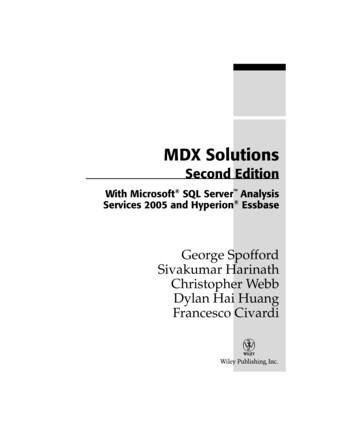
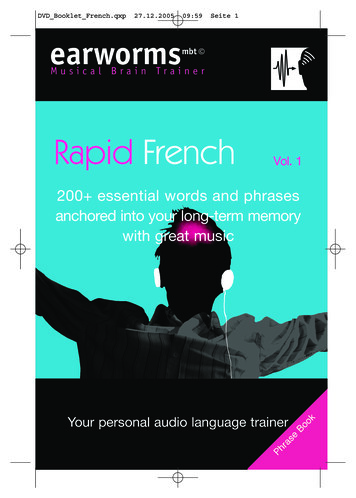
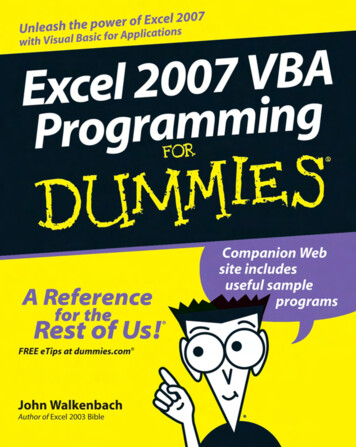

![Change Management Process For [Project Name] - West Virginia](/img/32/change-20management-20process-2003-2022-202012.jpg)

